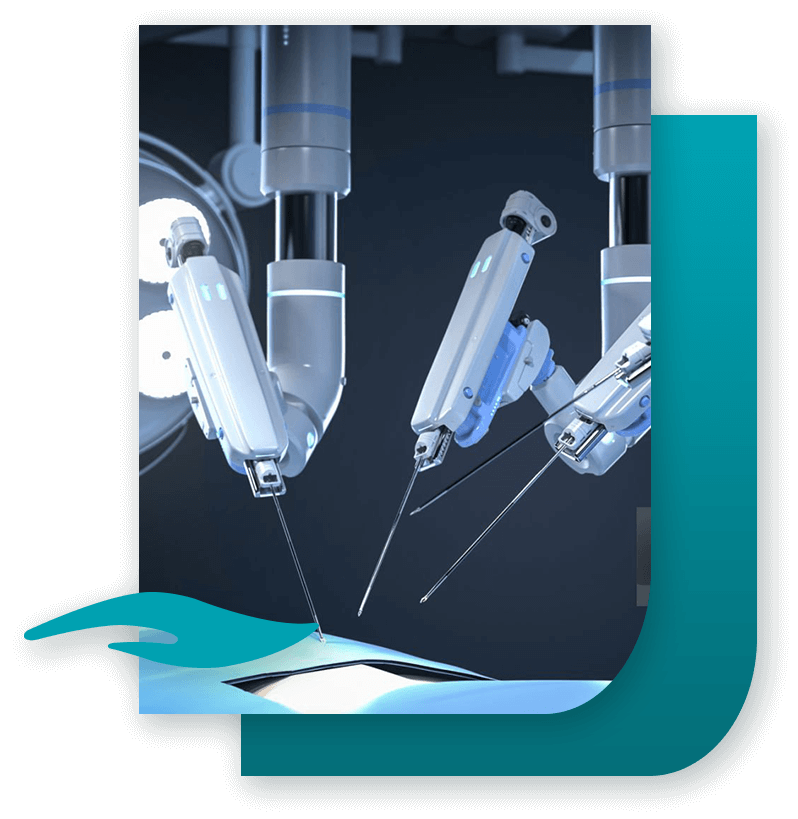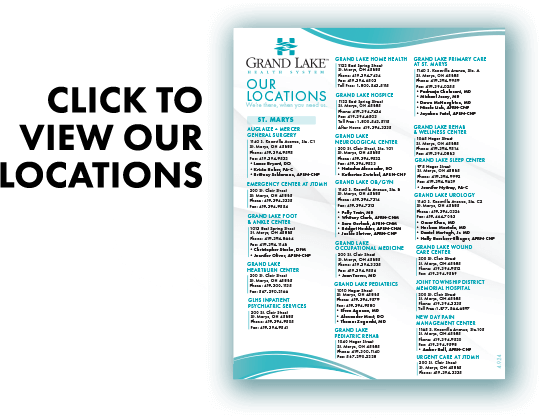When it comes to surgery,
You deserve the best
Surgical team.
Award-Winning Surgical Care to
Fit Your Needs
At Grand Lake Health System, we strive to deliver the highest quality care to patients through top-rated surgical leaders and innovative treatment options.
Ohio Hospital.

Surgical Procedures Available at Grand Lake Health System
REDESIGNING THE PATIENT EXPERIENCE
WITH ROBOTIC-ASSISTED SURGERY
Surgery is an area of medicine which has seen tremendous changes throughout the years, including advanced robotic techniques. This has enabled our team to serve our patients and community in bigger and better ways.
· Acessa Procedure
· Colonoscopy
· EGD
· ENT
· Hernia
· Minerva Endometrial Ablation
· Orthopedic
· Podiatry
· Urology
· Minerva Endometrial Ablation
· Orthopedic
· Podiatry
· Urology

Surgery Procedure FAQs
COLONOSCOPY
How do I make an appointment?
You can start with your primary care provider, or you can reach out to one of our general surgery offices.
What is preparation like for a Colonoscopy?
Many patients are afraid about preparing for a colonoscopy. We want to alleviate that fear by preparing you the best we can. Typically, you drink clear liquids for one day. It is accompanied by another fluid to thoroughly clean out your colon.
Will I be embarrassed or uncomfortable during my colonoscopy? How long will it take for me to recover?
You will be made comfortable during your procedure. The team will treat you with the utmost respect. Within a few hours you can leave with a driver. You can carry on normal activities the next day.
KIDNEY STONE MANAGEMENT
What is a kidney stone?
- Kidney stones are hard deposits made of minerals and salts that form inside your kidneys.
- Kidney stones can affect any part of your urinary tract — from your kidneys to your bladder. Often, stones form when the urine becomes concentrated, allowing minerals to crystallize and stick together.
- If stones become lodged in the urinary tract, are associated with a urinary infection or cause complications — surgery may be needed.
What are the treatment options for kidney stone?
- There are several types of procedures to treat kidney stones:
Shockwave Lithotripsy: provider uses shockwaves to break apart the stones from the outside of your body.
Ureteroscopy: provider inserts a scope through your urethra and bladder and inter your ureter. Instruments the provider passes through the scope can break up and remove the stone.
Will I need a stent?
The physician may place a small stent in the ureter during the procedure. This will help the stone fragment pass through the bladder. Stents can be removed in the office or by the patient as per surgeon instructions.
How do I apply for a position if I see one I’m interested in?
When you’re viewing the position you’re interested in, it’s easy to apply. Click the Apply Now button in the upper right corner. You will create an account and be able to apply to any job openings you’re interested in. All applicants must submit an online application to be considered for employment.
I have an account, but don’t remember my password. What do I do?
Lorem ipsum dolor sit amet, consectetur adipiscing elit. Ut elit tellus, luctus nec ullamcorper mattis, pulvinar dapibus leo.
How do I learn more about a job opening?
Lorem ipsum dolor sit amet, consectetur adipiscing elit. Ut elit tellus, luctus nec ullamcorper mattis, pulvinar dapibus leo.
I’ve applied for one of your open positions. What happens now?
Lorem ipsum dolor sit amet, consectetur adipiscing elit. Ut elit tellus, luctus nec ullamcorper mattis, pulvinar dapibus leo.
I applied for a job and haven’t heard back. Will someone contact me?
Lorem ipsum dolor sit amet, consectetur adipiscing elit. Ut elit tellus, luctus nec ullamcorper mattis, pulvinar dapibus leo.
What if I don’t meet the job requirements that are listed?
Lorem ipsum dolor sit amet, consectetur adipiscing elit. Ut elit tellus, luctus nec ullamcorper mattis, pulvinar dapibus leo.

